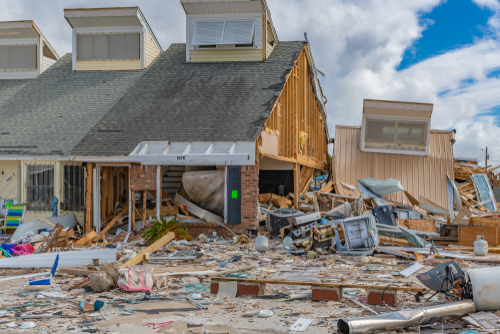When Property Insurers Push Back: Protecting Your Claim Rights
Filing a property insurance claim after damage to your home can feel like navigating a minefield. If you take one wrong step, your claim could be denied, delayed, or severely underpaid. Texas property owners face unique challenges when dealing with insurance companies, from hurricane damage to hail storms and flooding. Insurance companies often look for reasons to minimize payouts, making it crucial to understand how to avoid common pitfalls during the claims process. Knowing what mistakes to avoid and how to document your claim properly can significantly improve your chances of receiving fair compensation for your property damage.
Don’t let the complexities of property insurance claims leave you high and dry. Reach out to JCE Law Group for guidance that can make all the difference. Give us a call at 504-754-5884 or contact us today to ensure your claim is handled with the care and attention it deserves.

Understanding Texas Property Insurance Laws: Your Rights as a Policyholder
Texas has specific insurance laws designed to protect policyholders, though many aren’t aware of these protections until it’s too late. Under the Texas Insurance Code, insurance companies must promptly process claims in good faith. The Texas Prompt Payment of Claims Act requires insurers to acknowledge, investigate, and pay valid claims within specific timeframes. If an insurer violates these requirements, they may be liable for additional damages, including attorney’s fees and, in some cases, up to three times the amount of your claim. The Texas Deceptive Trade Practices Act (DTPA) protects against unfair claim-handling practices. Understanding these laws is your first defense against insurance companies that might try to deny or undervalue your claim unfairly. Too often, property owners accept an initial lowball offer simply because they don’t know their rights under Texas law.
Critical Timeline: Avoiding Costly Delays When Filing Your Claim
Timing issues undermine many property insurance claims. In Texas, most insurance policies require “prompt notice” of damage, which typically means filing within days of discovering the damage. Waiting too long can give insurance companies grounds to deny your claim outright. Here’s a timeline of essential steps to follow after property damage occurs:
-
Immediately document all damage with photos and videos before making temporary repairs
-
File your claim within 24-48 hours of discovering damage (most policies in Texas require notification within 30-60 days, but sooner is always better)
-
Keep detailed records of all communications with your insurance company, including the names of representatives, dates, times, and content of conversations.
-
Understand that for weather-related claims in Texas; insurance companies saw a 27% increase in denial rates following major storms in 2024 when documentation was incomplete
-
Respond promptly to all insurance company requests for information (typically within 15 days)
-
Be aware that you generally have two years from the date of loss to file a lawsuit against your insurance company in Texas if they wrongfully deny or underpay your claim
Navigating the Claims Process: How Experienced Property Insurance Representation Makes a Difference
When facing resistance from your insurance company, having knowledgeable legal support can completely transform your claim outcome. At JCE Law Group, we’ve seen countless claims initially denied or underpaid that were later fully covered once proper legal pressure was applied. Insurance companies know when dealing with an experienced property insurance lawyer who understands the intricacies of Texas insurance law. Before accepting any settlement offer, it’s crucial to have your claim professionally evaluated. Many property owners don’t realize that receiving an initial settlement often means signing away rights to claim additional damages discovered later. An experienced property insurance attorney can review your policy, identify coverage you might not know exists, and ensure all damage is properly documented and valued. They can also handle all communications with the insurance company, preventing you from inadvertently saying something that could jeopardize your claim.
Documenting Your Property Damage: The Evidence That Makes or Breaks Your Claim
Insurance companies routinely deny claims based on insufficient documentation. Creating a comprehensive record of your property damage is perhaps the most crucial step to protect your claim. This documentation serves as objective evidence that can contradict an adjuster’s assessment if they attempt to minimize the extent of your damages. Start by taking detailed photos and videos of all damaged areas before you begin any cleanup or repairs. These visual records should include wide shots showing the full scope of damage and close-ups of specific damaged items. Create an inventory list of all damaged property, including descriptions, age, replacement cost, and any receipts or appraisals you may have. If possible, don’t dispose of damaged items until the insurance adjuster has inspected them or permitted you to do so.
The Hidden Value of Third-Party Professional Assessments
One often overlooked strategy is obtaining independent professional assessments of your property damage. Insurance companies rely on their own adjusters, who may be incentivized to minimize claim values. Hiring your independent adjuster, contractor, or engineer to assess the damage is a powerful counterbalance to the insurance company’s evaluation. We’ve seen countless cases where our client’s claims were initially valued at just a fraction of their true worth until independent experts provided proper assessments. When presenting these professional evaluations alongside your claim, insurance companies often revise their position rather than risk litigation over demonstrably undervalued damages.
Understanding Policy Exclusions and Limitations: Reading the Fine Print
Many property owners are shocked to discover certain types of damage aren’t covered by their insurance policies. Texas policies often contain specific exclusions for flood damage, mold, foundation issues, or damage caused by lack of maintenance. According to the Texas Department of Insurance, approximately 40% of homeowners don’t fully understand their policy exclusions until after filing a claim. This knowledge gap leads to significant frustration and financial hardship when claims are denied. Before disaster strikes, review your policy carefully to understand what is and isn’t covered. Pay special attention to coverage limits, deductibles, and special provisions for weather-related events common in Texas like hurricanes, hail storms, and flooding. If you identify coverage gaps, consider purchasing additional policies or endorsements to ensure complete protection.
The Anti-Concurrent Causation Clause: A Major Coverage Trap
One of the most problematic policy provisions is the “anti-concurrent causation” clause in many Texas property insurance policies. This clause allows insurance companies to deny coverage if a combination of covered and non-covered perils caused your property damage. For example, if your home suffers damage from wind (typically covered) and flooding (typically excluded unless you have separate flood insurance), the insurance company might deny the entire claim—even for the wind damage—if they can argue the damages occurred concurrently. Understanding this clause is critical when documenting your claim. You’ll need to establish which damages were caused by covered perils and provide evidence separating these damages from any that excluded perils might have caused.
Dealing with Claim Denials and Lowball Offers: Your Response Strategy
When your claim is denied or significantly underpaid, your response in the following days is critical. First, request a written explanation detailing the reasons for the denial or reduced payment. Review this explanation against your policy language and the documentation you’ve gathered. You have the right to appeal if you believe the decision is incorrect. Submit a formal written appeal directly addressing each reason for the denial or underpayment, attaching any additional evidence supporting your position. Be aware that insurance companies in Texas must acknowledge your appeal within 15 days and make a decision within 45 days. If your appeal is unsuccessful, you may need to escalate the matter by filing a complaint with the Texas Department of Insurance or consulting a property insurance lawyer about possible legal action.
The Power of Persistence: Following Up Effectively
Insurance claims often stall simply because homeowners don’t follow up consistently. Create a communication log tracking every interaction with your insurance company, including dates, names of representatives, what was discussed, and any promises made. Follow up all phone conversations with an email summarizing what was discussed. If the insurance company requests additional information, provide it promptly but thoroughly. If they fail to respond within the timeframes required by Texas law, send a certified letter noting their failure to comply with state regulations. This paper trail keeps your claim moving forward and documents any bad faith practices that might strengthen a potential legal case if your claim isn’t resolved fairly.
Frequently Asked Questions
1. How long do I have to file a property insurance claim in Texas after damage occurs?
Most Texas insurance policies require “prompt notice” of damage, typically within 30-60 days of the damage occurring. However, specific timeframes vary by policy, so checking your particular insurance contract is essential. For the best results, you should file your claim within 24-48 hours of discovering damage. Delaying your claim can give the insurance company grounds for denial based on late reporting. Additionally, under Texas law, you generally have two years from the date of loss to file a lawsuit against your insurance company if they wrongfully deny or underpay your claim.
2. What should I do if my Houston property insurance claim is denied?
If your claim is denied, first request a detailed written explanation from your insurance company specifying the exact reasons for denial. Review this explanation alongside your policy language to identify any discrepancies. Gather additional documentation addressing the reasons for the denial and submit a formal written appeal. If your appeal is unsuccessful, consider filing a complaint with the Texas Department of Insurance. Consulting with a property insurance lawyer in Houston is often the most effective next step. An attorney can evaluate whether the denial was made in bad faith or violated Texas insurance laws and help you understand your legal options for pursuing fair compensation.
3. What common property insurance claim mistakes should Houston homeowners avoid?
Houston homeowners should avoid several critical mistakes when filing property insurance claims: 1) Failing to document damage thoroughly with photos and videos before making repairs; 2) Missing policy deadlines for reporting damage; 3) Accepting the first settlement offer without proper evaluation; 4) Making recorded statements to adjusters without understanding how statements might be used; 5) Signing releases or waivers before understanding their implications; 6) Disposing of damaged property before the adjuster inspection; 7) Failing to obtain independent damage assessments from qualified professionals; and 8) Not reading and understanding policy exclusions before a loss occurs. Avoiding these mistakes significantly increases your chances of receiving fair compensation.
4. How does the Houston insurance claim process typically work from start to finish?
The typical Houston insurance claim process follows these steps: 1) You report the damage to your insurance company; 2) The insurer assigns an adjuster who schedules an inspection; 3) The adjuster assesses the damage and reviews your coverage; 4) Based on the adjuster’s report, the insurance company makes a coverage determination; 5) If approved, they issue an initial payment that may include depreciation deductions; 6) You begin repairs, typically using the initial payment; 7) Once repairs are completed with proper documentation, you can claim the held-back depreciation amount (for replacement cost policies); 8) If disputes arise about coverage or damage valuation, you may need to engage in the appeal process or seek legal assistance. This process typically takes 30-90 days for straightforward claims but can extend much longer for complex or disputed claims.
5. When should I consider hiring a property insurance lawyer in Houston for my claim?
Consider hiring a property insurance lawyer if:
1) Your claim has been denied despite having valid coverage;
2) You’ve received a settlement offer that seems significantly lower than the actual damage costs;
3) Your claim has been delayed beyond the timeframes required by Texas law;
4) The insurance company is requesting excessive documentation or making unreasonable demands;
5) You’re being pressured to accept a quick settlement;
6) Your claim involves complex damage requiring substantial repairs;
7) The insurance company is attributing damage to excluded causes despite evidence to the contrary or
8) You’re experiencing bad faith practices such as misrepresenting policy provisions or failing to investigate your claim properly. Most property insurance attorneys offer free initial consultations to evaluate your case.
Work with a Property Insurance Lawyer
Dealing with property damage is stressful enough without having to fight your insurance company for fair treatment. When insurance companies delay, deny, or underpay legitimate claims, having professional legal representation can level the playing field. A property insurance lawyer can evaluate your policy, identify all potential coverage, properly document your claim, handle all communications with the insurance company, and pursue legal remedies if necessary. They understand insurance companies’ tactics to minimize payouts and know how to counter these strategies effectively. While not every claim requires legal representation, when significant damage or coverage disputes are involved, the skilled experience of a property insurance attorney can make a substantial difference in the outcome of your claim. If you’re struggling with a property insurance claim, consider scheduling a consultation to evaluate your situation with a professional who understands Texas insurance law and can advise you on the best path forward.
Don’t go it alone when it gets tough with property insurance claims. Let JCE Law Group guide you through the stormy seas of insurance disputes. Dial 504-754-5884 or contact us today to ensure your claim sails smoothly toward a fair resolution.


